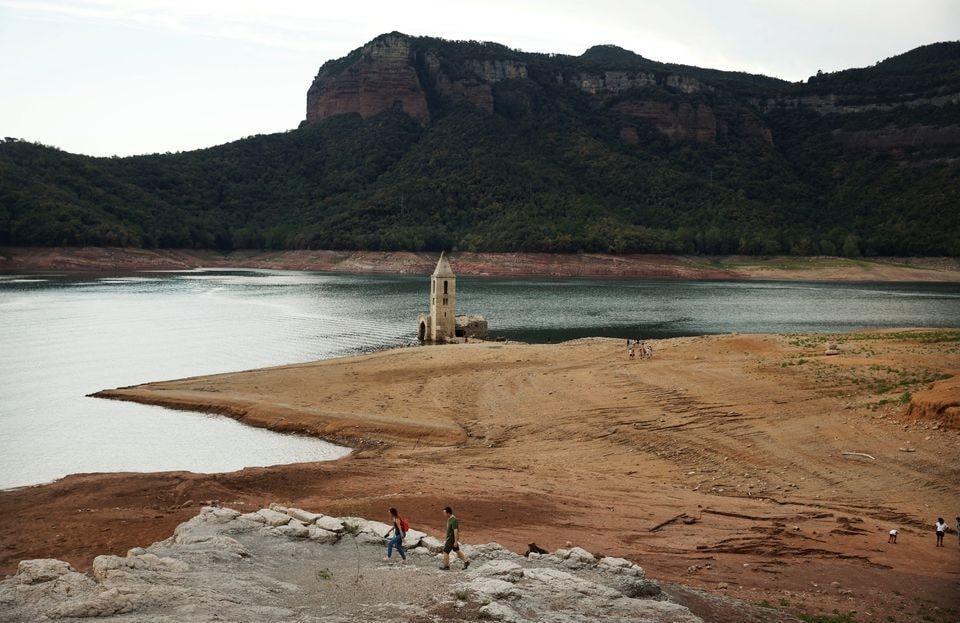5 unexpected impacts of drought in Europe

Drought has led to a dried-up dam near Barcelona in Spain, where a ninth-century Romanesque church has re-emerged still intact. Image: REUTERS/Albert Gea
Listen to the article
- Record-breaking droughts are being declared around the world.
- Europe has experienced prolonged hot weather and heatwaves, which have impacted lives and livelihoods.
- From nuclear power plants that can't be cooled to unexploded WW2 bombs discovered on riverbeds, drought means more than just a water shortage.
Drought has been declared across the globe, from the Horn of Africa, to China and England, as climate change continues unabated.
More than 18 million people in Ethiopia, Somalia and Kenya face severe hunger, after four consecutive years of lower-than-average rainfall.
Prolonged periods of hot weather and heatwaves are taking their toll on livelihoods in more developed countries as wildfires have scorched swathes of land and crop failure is predicted.
But drought is also having some unexpected impacts in parts of Europe.
1. Salt production in France
France is experiencing its worst drought on record, which has affected its maize production - with only half of the crop in a ‘good or excellent condition’ on 8 August.
But temperatures have also accelerated salt water evaporation, meaning the salt farmers of the country’s Guerande region are due record production of Fleur de Sel, which forms in crystals as the water evaporates from the salt marshes.
Producer Francois Durand told Reuters this year’s yield could be nearly double the average of 1.3 tonnes per year.

2. Shipping delays on the Rhine
In Germany, the lack of rainfall has meant its major shipping artery, the Rhine, has dropped to such a low level, less freight can be transported, leading to delays and higher costs.
The Rhine flows through Germany’s industrial heartland, from the Swiss Alps to the North Sea carrying everything from grains, to chemicals and coal. But boats have been loaded to only 30-40% capacity to avoid running aground.
The disruption could impact the country’s economic growth by as much as half a percentage point, according to economists.
3. Drought impacts electricity generation
In the midst of an energy crisis, drought is also putting pressure on the power supply.
Hydropower generation, which relies on water to produce electricity, has fallen by 44% in Spain, according to the BBC, and 20% overall.
Water is also needed to cool nuclear power plants - and some nuclear plants in France have had to reduce output as the rivers have been too low and warm to cool the plants, according to the Guardian.
4. A World War Two bomb in Italy
As rivers and lakes dry up, the dropping water levels are exposing previously submerged artefacts, including an unexploded World War Two bomb on the bed of the River Po in Italy, near Mantua.
Some 3,000 local residents were evacuated - and traffic on the river and nearby roads and railway was stopped - so the bomb could be removed and then destroyed in a controlled explosion.
"At first, some of the inhabitants said they would not move, but in the last few days, we think we have persuaded everyone," Francesco Aporti, the mayor of nearby Borgo Virgilio village, told Reuters.
5. Ancient ruins in dried-up dams
Meanwhile, at a dried-up dam near Barcelona in Spain, a ninth-century Romanesque church has reemerged still intact.
And at the Buendia reservoir to the east of Madrid, the ruins of a village and bathhouses have reappeared, Reuters drone footage showed.
Perhaps most surprising of all is the emergence of a prehistoric stone circle - dubbed the Spanish Stonehenge - in the Valdecanas reservoir, in the central province of Caceres.
Known as the Dolmen of Guadalperal, the circle of dozens of megalithic stones is believed to date back to 5000 BC - and archaeologists are racing to study it before it gets submerged again.
It was discovered by German archaeologist Hugo Obermaier in 1926, but the area was flooded in 1963 in a rural development project under Francisco Franco's dictatorship.

What is the Forum doing to address the global water challenge?
Don't miss any update on this topic
Create a free account and access your personalized content collection with our latest publications and analyses.
License and Republishing
World Economic Forum articles may be republished in accordance with the Creative Commons Attribution-NonCommercial-NoDerivatives 4.0 International Public License, and in accordance with our Terms of Use.
The views expressed in this article are those of the author alone and not the World Economic Forum.
Stay up to date:
Fresh Water
Related topics:
Forum Stories newsletter
Bringing you weekly curated insights and analysis on the global issues that matter.
More on Climate Action and Waste Reduction See all
Planet in focus: The technologies helping restore balance – and other news to watch in frontier tech
Jeremy Jurgens
November 13, 2025






